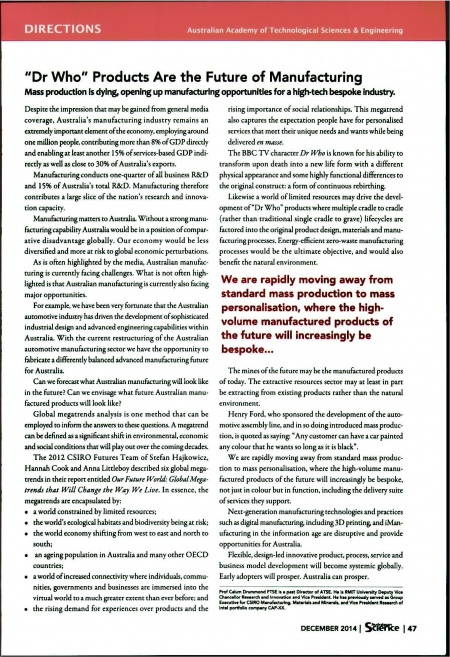Dr Who Products Are the Future of Manufacturing
- Publication: Australasian Science
- Date: December 2014
- Author: Calum Drummond
- Page: 47
- Language: English
Mass production is dying, opening up manufacturing opportunities for a high-tech bespoke industry.
Despite the impression that may be gained from general media coverage, Australia's manufacturing industry remains an extremely important element of the economy, employing around one million people, contributing more than 8% of GDP directly and enabling at least another 15% of services-based GDP indirectly as well as close to 3096 of Australia's exports.
Manufacturing conducts one-quarter of all business R&D and 15% of Australia's total R&D. Manufacturing therefore contributes a large slice of the nation's research and innovation capacity.
Manufacturing matters to Australia. Without a strong manufacturing capability Australia would be in a position of comparative disadvantage globally. Our economy would be less diversified and more at risk to global economic perturbations.
As is often highlighted by the media, Australian manufacturing is currently facing challenges. What is not often highlighted is that Australian manufacturing is currently also facing major opportunities.
For example, we have been very fortunate that the Australian automotive industry has driven the development of sophisticated industrial design and advanced engineering capabilities within Australia. With the current restructuring of the Australian automotive manufacturing sector we have the opportunity to fabricate a differently balanced advanced manufacturing future for Australia.
Can we forecast what Australian manufacturing will look like in the future? Can we envisage what future Australian manufactured products will look like?
Global megatrends analysis is one method that can be employed to inform the answers to these questions. A megatrend can be defined as a significant shift in environmental, economic and social conditions that will play out over the coming decades.
The 2012 CSIRO Futures Team of Stefan Hajkowicz, Hannah Cook and Anna Littleboy described six global mega-trends in their report entitled Our Future World: Global Mega-trends that Will Change the Way We Live. In essence, the megatrends are encapsulated by:
• a world constrained by limited resources:
• the world's ecological habitats and biodiversity being at risk;
• the world economy shifting from west to east and north to south;
• an ageing population in Australia and many other OECD countries;
• a world of increased connectivity where individuals, communities, governments and businesses are immersed into the virtual world to a much greater extent than ever before; and
• the rising demand for experiences over products and the rising importance of social relationships. This megatrend also captures the expectation people have for personalised services that meet their unique needs and wants while being delivered en masse.
The BBC TV character Dr Who is known for his ability to transform upon death into a new life form with a different physical appearance and some highly functional differences to the original construct: a form of continuous rebirthing.
Likewise a world of limited resources may drive the development of "Dr Who" products where multiple cradle to cradle (rather than traditional single cradle to grave) lifecycles are factored into the original product design, materials and manufacturing processes. Energy-efficient zero-waste manufacturing processes would be the ultimate objective, and would also benefit the natural environment.
The mines of the future may be the manufactured products of today. The extractive resources sector may at least in part be extracting from existing products rather than the natural environment.
Henry Ford, who sponsored the development of the automotive assembly line, and in so doing introduced mass production, is quoted as saying: "Any customer can have a car painted any colour that he wants so long as it is black".
We are rapidly moving away from standard mass production to mass personalisation, where the high-volume manufactured products of the future will increasingly be bespoke, not just in colour but in function, including the delivery suite of services they support.
Next-generation manufacturing technologies and practices such as digital manufacturing including 3D printing and iManufacturing in the information age are disruptive and provide opportunities for Australia.
Flexible, design-led innovative product, process, service and business model development will become systemic globally. Early adopters will prosper. Australia can prosper.
Prof Glum Drummond FTSE is a part Director of ATSE. H. is RMIT University Deputy like Chancellor Research and Innovation end Vice President. He has previourty saved as Group Executive for CSIRO Manufacturing, Materials and Minerals, and Vice President Research of Intel portfolio company CAP-XX.
Disclaimer: These citations are created on-the-fly using primitive parsing techniques. You should double-check all citations. Send feedback to whovian@cuttingsarchive.org
- APA 6th ed.: Drummond, Calum (December 2014). Dr Who Products Are the Future of Manufacturing. Australasian Science p. 47.
- MLA 7th ed.: Drummond, Calum. "Dr Who Products Are the Future of Manufacturing." Australasian Science [add city] December 2014, 47. Print.
- Chicago 15th ed.: Drummond, Calum. "Dr Who Products Are the Future of Manufacturing." Australasian Science, edition, sec., December 2014
- Turabian: Drummond, Calum. "Dr Who Products Are the Future of Manufacturing." Australasian Science, December 2014, section, 47 edition.
- Wikipedia (this article): <ref>{{cite news| title=Dr Who Products Are the Future of Manufacturing | url=http://cuttingsarchive.org/index.php/Dr_Who_Products_Are_the_Future_of_Manufacturing | work=Australasian Science | pages=47 | date=December 2014 | via=Doctor Who Cuttings Archive | accessdate=19 April 2024 }}</ref>
- Wikipedia (this page): <ref>{{cite web | title=Dr Who Products Are the Future of Manufacturing | url=http://cuttingsarchive.org/index.php/Dr_Who_Products_Are_the_Future_of_Manufacturing | work=Doctor Who Cuttings Archive | accessdate=19 April 2024}}</ref>
